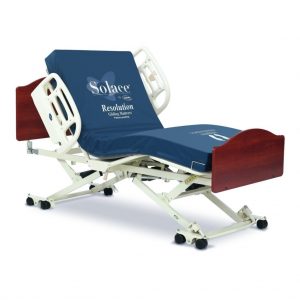





Buying a hospital bed for your loved one can be a grueling process. What’s the best bed for their condition? How do you know what type of mattress they need? Which features are critical to their safety? Here at HomeCare Hospital Beds, we want to make the process as simple and efficient as possible. That’s why we put together a Purchasing Guide to help you narrow down your search.
Call our hospital bed experts Monday – Friday 7:30 am – 5:30 pm EST for help at (877) 414-0002
The bed frame determines the support and stability of the bed. Hospital bed frames have varying bed decks that provide support, such as spring, grid, slat and full decks. The bed frame can also have a variety of different functions based on if they are manual, semi-electric or full-electric beds. Manual and Semi Electric beds are cheaper than Full Electric Beds and are ideal when your loved one will only need the bed for a short period of time. The functions offered in different beds can include Hi-Low functions to move the patient up and down for easy caregiver access, head/knee functions for patient comfort and trendelenburg functions for patients that require a more clinically advanced position.
The mattress plays a pivotal role in providing comfort and protection for your loved one.The mattress chosen for a patient is extremely important in the process of purchasing a bed. Those who spend more time in bed, but are still able to get out of bed with assistance, require a higher grade pressure redistribution mattress compared to patients who are still mobile and able to get out of bed regularly. For those who are restricted to their bed for a majority of the day, specialty mattresses that include Low Air Loss or Lateral Rotation functions can help prevent, protect and provide relief from pressure sores, more commonly known as bed sores.
Full electric beds use a hand pendant to control each function the bed is able to perform. The head section, knee section, and high low function can be controlled through pressing the buttons on the pendant. Full electric beds can be lowered for patients to easily get out of bed and raised high enough for caregivers to provide assistance safely.

Hi-Low beds allow for extra protections for patients who are at an increased risk of falling out of bed. Hi-low beds offer all the same benefits as a full-electric bed, with a bed deck that’s 7 inches from the floor (without the mattress). Hi-Low beds are perfect for assisted living facilities and at home so patients can safely get in and out of bed. Hi-low beds rise automatically as the patient is standing as an extra safety measure.
Bariatric beds are bigger, stronger full electric hospital beds built with more durability to support patients that range in weight from 350 lbs to 1000 lbs. These beds offer all the same amenities as the full-electric bed, in a wider and more sturdy package.
We know that choosing a HomeCare bed for you or a loved one is not an easy task. We always want you to feel informed before you make a purchase. If you have any doubts that a bed is right for you, please contact us so we can help you make the right choice.
Call us today toll free at (877)414-0002 or email us at Info@HomeCareHospitalBeds.com.




| Cookie | Duration | Description |
|---|---|---|
| cookielawinfo-checkbox-analytics | 11 months | This cookie is set by GDPR Cookie Consent plugin. The cookie is used to store the user consent for the cookies in the category "Analytics". |
| cookielawinfo-checkbox-functional | 11 months | The cookie is set by GDPR cookie consent to record the user consent for the cookies in the category "Functional". |
| cookielawinfo-checkbox-necessary | 11 months | This cookie is set by GDPR Cookie Consent plugin. The cookies is used to store the user consent for the cookies in the category "Necessary". |
| cookielawinfo-checkbox-others | 11 months | This cookie is set by GDPR Cookie Consent plugin. The cookie is used to store the user consent for the cookies in the category "Other. |
| cookielawinfo-checkbox-performance | 11 months | This cookie is set by GDPR Cookie Consent plugin. The cookie is used to store the user consent for the cookies in the category "Performance". |
| viewed_cookie_policy | 11 months | The cookie is set by the GDPR Cookie Consent plugin and is used to store whether or not user has consented to the use of cookies. It does not store any personal data. |